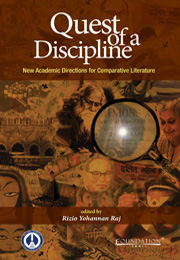Book contents
- Frontmatter
- Contents
- List of Contributors
- Acknowledgements
- Prologue to the “Quest'
- Introduction
- PART I Traditions and Manifestoes: Reflecting on Perspectives
- PART II The Quest Motif: Redefining the Scope of Comparative Literature
- 4 Beyond ‘Other Words’: The ‘Relevance’ of Translatology as Comparative Literature
- 5 Intertextual Lores and the Play of Language: Folklore/Orality in the Comparative Context of Literature
- 6 Towards a Comparative Performance Studies
- 7 Media Studies and the Academic Elite
- 8 Comparative Film Studies: The Culture Studies Turn in Comparative Literature
- 9 Finding Space in the Margin: Teaching Women's Literature in a Comparative Perspective
- PART III The Dynamics of Exchange: Genres, Areas and Disciplines
- PART IV India: A Curious Comparative Space
- Afterword: Comparative? Literature?
- Index
4 - Beyond ‘Other Words’: The ‘Relevance’ of Translatology as Comparative Literature
from PART II - The Quest Motif: Redefining the Scope of Comparative Literature
Published online by Cambridge University Press: 05 June 2012
- Frontmatter
- Contents
- List of Contributors
- Acknowledgements
- Prologue to the “Quest'
- Introduction
- PART I Traditions and Manifestoes: Reflecting on Perspectives
- PART II The Quest Motif: Redefining the Scope of Comparative Literature
- 4 Beyond ‘Other Words’: The ‘Relevance’ of Translatology as Comparative Literature
- 5 Intertextual Lores and the Play of Language: Folklore/Orality in the Comparative Context of Literature
- 6 Towards a Comparative Performance Studies
- 7 Media Studies and the Academic Elite
- 8 Comparative Film Studies: The Culture Studies Turn in Comparative Literature
- 9 Finding Space in the Margin: Teaching Women's Literature in a Comparative Perspective
- PART III The Dynamics of Exchange: Genres, Areas and Disciplines
- PART IV India: A Curious Comparative Space
- Afterword: Comparative? Literature?
- Index
Summary
INTRODUCTION
The intertextuality built into the title of this paper might contribute to our understanding of the complex that Comparative Literature is. Since its entry into the academy, Comparative Literature has been a controversial site as regards its scope and definitive function; comparative literary scholars themselves have found it largely problematic to discuss the extent to which their ‘discipline’ can/must reach out. Yet, no one questions the effectiveness of the comparative method as a means of understanding the texts of literature and life. Given this ‘condition’, the deliberations we attempt to organize here cannot/need not be conclusive regarding the scope of our discipline, but these must vitally contribute to its present organisation. Faced with such a curious dialectic, a paper such as this that hazardously tries to correlate two problematic modes of knowing such as ‘translation’ and ‘comparison’ has a double-edged task. Primarily, it has to inquire, at least briefly, into the scope of Comparative Literature as a valid discipline with its own methodologies and perspectives, before considering if the area largely known as Translation Studies since James Holmes' pamphlet in 1975, or Translatology as it is designated here for reasons we will soon discuss, can become a directional component of Comparative Literature.
Comparative Literature: A ‘Relevant’ Interdisciplinary Site
The task of Comparative Literature has been a topic of academic discussion from the days of Meltzl and Possnet. Later, from Rene Wellek to Gayatri Spivak, academicians across the world have variously discussed the many crises faced by Comparative Literature as a discipline.
- Type
- Chapter
- Information
- Quest of a DisciplineNew Academic Directions for Comparative Literature, pp. 63 - 93Publisher: Foundation BooksPrint publication year: 2012



